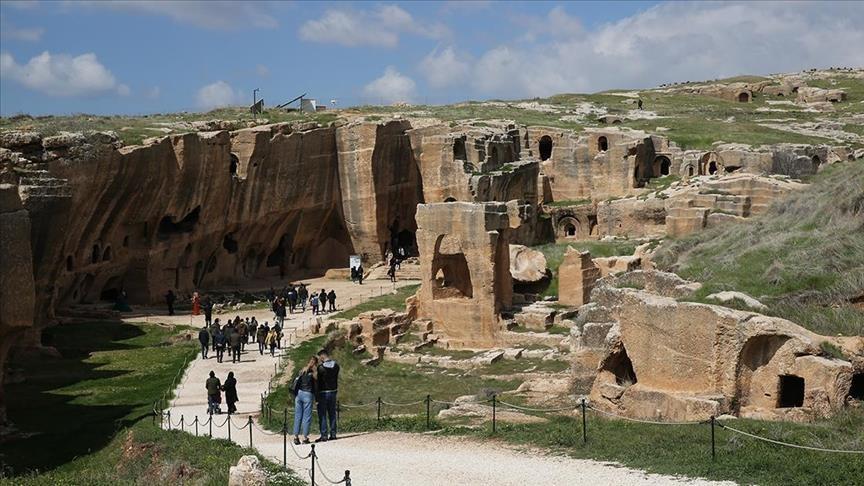Rich historical sites in southeast Turkey draw tourists
ISTANBUL

A quartet of sites in southeastern Turkey are drawing more and more attention from tourists with their countless millennia of rich history.
The famed ancient site of Göbeklitepe in Şanlıurfa province is one the most popular destinations for both domestic and foreign tourists.
Göbeklitepe, known as the world’s oldest temple, has been on UNESCO’s World Heritage Tentative List since 2011. It was discovered in 1963 when researchers from the universities of Istanbul and Chicago were working at the site.
It was also the most-visited site via Turkey’s virtual museum program, with 1.6 million visits.
In work at the site since 1995, the German Archaeological Institute and Sanliurfa Museum have found T-shaped obelisks from the Neolithic era measuring three to six meters (10-20 feet) high and weighing 40-60 tons.
During the excavations, 12,000-year-old diverse artifacts such as human figurines measuring 65 centimeters (26 inches) were also discovered.
Expressing his satisfaction with rising interest in the region, Muslum Coban, head of a regional chamber of tourist guides, said that Turkey's southeast is the least risky region during the COVID-19 pandemic.
"Many people who want to do a tour and travel are planning to come to the region," he added.
World Heritage site Mt. Nemrut
Located in Kahta in the Adıyaman province, Mt. Nemrut, towering 2,134-meters (7,001 feet) high, is a UNESCO World Heritage site with a rich history.
Also known as the Eighth Wonder of the World, it is famed for its summit, where several larger-than-life statues of Greek and Persian gods are erected around what is assumed to be a royal tomb from the first century BC.

Protected as a national park, the region attracts thousands of domestic and foreign tourists every year.
After climbing Mt. Nemrut, visitors have the opportunity to see the unique sunset after a 40-minute walk of 800 meters (875 yards).
Local and foreign tourists take pictures to immortalize the beautiful view they see on the mountain summit before sunset.
Ancient city of Dara
In addition to its historical texture, Mardin is among Turkey's most unique places to visit thanks to the harmony within the city, emanating from the positive bonds shared by various faiths.
The ruins of the ancient city of Dara, featuring ancient rock tombs dating back to the fifth century A.D., are hailed as the "Ephesus of Mesopotamia." Dara was an important settlement along the famed Silk Road.
The Roman-era ancient city, just 30 kilometers (19 miles) from the Mardin city center, boasts a popular necropolis where religious ceremonies were held and hundreds of people were laid to rest.
Ahmet Alanli, the secretary-general of the Dicle Development Agency (DIKA), told Anadolu Agency that Dara has one of the most important city wall structures in the world.
"We’re planning to get Dara onto the UNESCO World Heritage Tentative List. Our aim is to bring tourism to this place and ensure development of the region," he added.
Yesemek open-air museum
Located in the village of Yesemek in Gaziantep's Islahiye district, the Yesemek open-air museum and sculpture workshop is another historical site that draws tourists.
The archeological site, which features 518 statues on the UNESCO World Heritage Tentative List, is visited by some 15,000 people every year.

"8,683 people visited the museum in 2020. This number is of course very low for us. The numbers fell due to COVID-19, but I believe that with normalization, the number of visitors will rise again,” said Ali Çicek, a museum guide for nearly 20 years.
The unique site was a quarry in the Hittite period and occupies an area of 100,000 square meters (120,000 square yards), making it the largest known stonemasonry workshop in the ancient Near East.
















